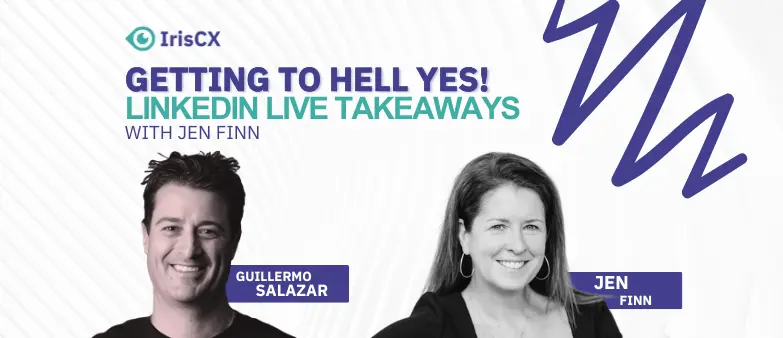In multifamily operations, challenges like high staff turnover, information silos, and operational inefficiencies often feel insurmountable. But for Jen Finn, Co-Founder and CEO of Hio, these challenges represent opportunities for transformation. With over 30 years of experience leading digital innovation in industries like financial services and multifamily, Jen has proven that aligning solutions with real-world problems can unlock new levels of efficiency and engagement.
Hio, a Conversational AI platform, simplifies operations by providing staff with instant access to critical materials, like Standard Operating Procedures (SOPs) and policies, through natural language queries. Jen’s journey from digital transformation in banking to revolutionizing multifamily offers valuable lessons for sellers looking to achieve ‘Hell Yes!’ moments with their buyers. Her approach unfolds through four key themes: Multifamily Meets Conversational AI, Challenges in the Industry, Turning Points, and Achieving Results.
1. Multifamily Meets Conversational AI
Jen Finn’s career reflects her commitment to innovation and operational excellence. Before founding Hio, she led transformation initiatives at companies like Capital One, where she helped bridge the gap between customer expectations and scalable operations. Her entry into the multifamily sector came after noticing parallels between financial services’ digital evolution and multifamily’s current operational struggles.
“In banking, everything could be standardized, but the built world—multifamily—demands a balance of structure and adaptability,” Jen explains. Hio was born from this understanding: to empower multifamily teams by simplifying how they access and use critical information. The platform integrates with existing systems like SharePoint, providing staff with the tools they need to make faster, more accurate decisions.
2. Challenges in the Multifamily Industry
Despite advancements, multifamily remains plagued by inefficiencies that hinder staff productivity and operational consistency.
Operational Pain Points
- Staff Turnover and Information Overload: High employee turnover leaves properties scrambling to train new hires. Without easy access to SOPs or clear guidance, staff often feel overwhelmed.
- Outdated Knowledge Management: Many operators lack centralized, accessible systems, leaving employees to sift through email chains or outdated files for answers.
- Inconsistent Service Delivery: The absence of standardized processes leads to discrepancies in how teams handle tasks, frustrating residents and impacting NOI.
Cultural and Technological Hurdles
- Resistance to Technology: Multifamily operators are often skeptical of new solutions, particularly AI, due to prior negative experiences with complex or poorly implemented technology.
- Legacy Mindsets: “The biggest challenge is overcoming the legacy mindset that assumes complexity equals chaos,” Jen notes. Operators struggle to see how simplifying access to information can drive better outcomes.
3. Turning Point: Harnessing Conversational AI
Jen believes that true transformation begins when operators recognize that operational inefficiencies are not inevitable—they’re solvable. For many, the turning point comes when they face mounting pressures from rising costs, turnover, and the need to scale.
Trigger Events
- Staffing Challenges: High turnover rates push operators to explore solutions that reduce the burden of onboarding and training.
- Operational Cost Pressures: Rising expenses, coupled with compressed rents, force operators to rethink how they scale without compromising service quality.
The Solution
Hio’s Conversational AI addresses these challenges by centralizing access to critical information. Staff can ask questions in natural language—like “What’s our policy on late fees?”—and receive accurate answers instantly. This reduces time spent searching for information and enables teams to focus on delivering better service.“It’s about supporting teams with the right tools to handle increasing complexity without adding to their workload,” Jen explains. By integrating with existing systems and offering seamless user experiences, Hio makes adoption straightforward and impactful.
4. Achieving ‘Hell Yes!’ Moments
Jen’s success with Hio lies in her ability to align her solution with buyers’ most pressing pain points. Her strategy includes understanding buyer motivations, tailoring messaging, and fostering trust.
Jen’s Approach
Understand the Buyer’s Pain:
- Jen identifies overwhelmed operators as ideal clients—those who struggle with inaccessible SOPs, inconsistent training, or the inability to scale efficiently.
- “Our best clients are those who’ve tried centralizing information but found their staff still couldn’t locate what they needed,” she says.
Tailor Messaging:
- By avoiding tech jargon and focusing on ROI, Jen speaks the buyer’s language. “Objections often reveal a buyer’s real concerns. By listening deeply, we turn those into opportunities,” she explains.
Build Trust:
- Offering trials and showcasing client success stories helps Hio gain credibility. “Trust is key when introducing new technology,” Jen emphasizes. A recent client reported that Hio answered 95% of their staff’s questions, freeing managers to focus on higher-priority tasks.
The Results
Operators using Hio see reduced turnover, faster onboarding, and more consistent service delivery. By empowering teams with real-time access to information, properties operate more efficiently and provide better resident experiences. “One client told us, ‘Hio saves us hours every day. It’s like having an extra team member who never sleeps,’” Jen shares.
5. Takeaways for Sellers
Jen’s approach offers actionable insights for sellers looking to connect with multifamily operators and achieve meaningful results.
1. Solve for the Human Element:
Technology isn’t enough on its own. Sellers must show how their solutions improve team efficiency and morale while addressing operational challenges.
2. Speak the Buyer’s Language:
Avoid overloading buyers with technical details. Instead, focus on how your solution directly addresses their pain points and delivers measurable results.
3. Build Momentum with Small Wins:
Pilot programs and quick ROI demonstrations help build buyer confidence and secure internal buy-in. “Small wins lead to big transformations,” Jen says.“
When teams stop firefighting and start thriving, that’s when you know you’ve made a difference,” Jen says. By embracing Conversational AI and simplifying operations, multifamily operators can unlock new levels of efficiency and consistency, transforming how their teams work—one empowered conversation at a time.
Listen to the “Getting to Hell Yes!” podcast on apple or spotify here:
https://open.spotify.com/show/4TY87ToVuLK7eqkZZvZA5T
https://podcasts.apple.com/gm/podcast/getting-to-hell-yes/id1772602174




